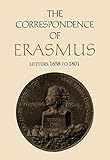The Correspondence of Erasmus : Letters 1658-1801, Volume 12 / Desiderius Erasmus.
Material type: TextSeries: Collected Works of Erasmus ; 12Publisher: Toronto : University of Toronto Press, [2003]Copyright date: ©2003Description: 1 online resource (500 p.)Content type:
TextSeries: Collected Works of Erasmus ; 12Publisher: Toronto : University of Toronto Press, [2003]Copyright date: ©2003Description: 1 online resource (500 p.)Content type: - 9780802048318
- 9781442680982
- 199.492
- PA8511.A5 E73 2003eb
- online - DeGruyter
| Item type | Current library | Call number | URL | Status | Notes | Barcode | |
|---|---|---|---|---|---|---|---|
 eBook
eBook
|
Biblioteca "Angelicum" Pont. Univ. S.Tommaso d'Aquino Nuvola online | online - DeGruyter (Browse shelf(Opens below)) | Online access | Not for loan (Accesso limitato) | Accesso per gli utenti autorizzati / Access for authorized users | (dgr)9781442680982 |
Browsing Biblioteca "Angelicum" Pont. Univ. S.Tommaso d'Aquino shelves, Shelving location: Nuvola online Close shelf browser (Hides shelf browser)

|

|

|

|

|

|

|
||
| online - DeGruyter The Correspondence of Erasmus : Letters 1356 to 1534, Volume 10 / | online - DeGruyter The Correspondence of Erasmus : Letters 142 to 297, Volume 2 / | online - DeGruyter The Correspondence of Erasmus : Letters 1535-1657, Volume 11 / | online - DeGruyter The Correspondence of Erasmus : Letters 1658-1801, Volume 12 / | online - DeGruyter The Correspondence of Erasmus : Letters 298 to 445, Volume 3 / | online - DeGruyter The Correspondence of Erasmus : Letters 446 to 593, Volume 4 / | online - DeGruyter The Correspondence of Erasmus : Letters 594 to 841, Volume 5 / |
restricted access online access with authorization star
http://purl.org/coar/access_right/c_16ec
The letters in Volume 12 cover Erasmus' correspondence for all of 1526 and roughly the first quarter of 1527. This was a difficult period for Erasmus for various reasons, including two bouts of illness serious enough to cause him to draw up his first will in January 1527, and the fact that the Reformers were gaining more and more influence over religious policy in Basel, where he resided. Tension caused by Erasmus' open opposition to this trend was multiplied by the continuing decline in his relations with Oecolampadius, Pellicanus, and Zwingli, all of them former friends or even collaborators in his scholarly editions. These many distractions slowed but did not stop his continuing biblical, patristic, and classical scholarship. Fearing that the Lutherans might gain complete control of public discourse on the disputed issue of free will, Erasmus rushed to complete his rebuttal to Luther's De servo arbitrio in March 1526. He also felt deeply aggrieved by the attacks launched against him by conservative Catholics at a time when he was actively engaged in opposing the spread of heresy in Germany and Switzerland. His most redoubtable antagonist was Nodl BTda of the University of Paris, who pressed ahead with his plans for a condemnation of Erasmus by the faculty, which he achieved in December 1527. Erasmus' critics at Louvain were more discreet than BTda; their published works obliquely criticized his publications but did not attack him by name. The letters of 1526-1527 also reflect Erasmus' growing fame in Spain, where not only the Latinate intellectuals but also readers of the new Spanish translations of his spiritual writings and satirical works were attracted to his ideas of spiritual renewal.CWE 12 also contains translations of his earliest will and selections from correspondence among his Spanish admirers during the years 1522-1527. An important and extremely useful appendix, 'Money, Wages, and Real Incomes in the Age of Erasmus,' by John H. Munro, analyzes the purchasing power of money in the period 1500-1540.
Mode of access: Internet via World Wide Web.
In English.
Description based on online resource; title from PDF title page (publisher's Web site, viewed 01. Nov 2023)


